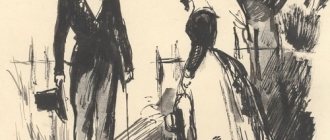Article menu Part one, list of chapters.
- Part one
- Chapter I
- Chapter II
- Chapter III
- Chapter IV
- Chapter V
- Chapter VI
- ChapterVII
- Chapter VIII
- Chapter IX
- Chapter X
- Chapter XI
Part two, list of chapters.
- Part two
- Chapter I
- Chapter II
- Chapter III
- Chapter IV
- Chapter V
- Chapter VI
- ChapterVII
- Chapter VIII
- Chapter IX
- Chapter X
- Chapter XI
- Chapter XII
Part three, list of chapters.
- Part three
- Chapter I
- Chapter II
- Chapter III
- Chapter IV
- Chapter V
- Chapter VI
- ChapterVII
- Chapter VIII
- Chapter IX
- Chapter X
- Chapter XI
- Chapter XII
Part four, list of chapters.
- Part four
- Chapter I
- Chapter II
- Chapter III
- Chapter IV
- Chapter V
- Chapter VI
- ChapterVII
- Chapter VIII
- Chapter IX
- Chapter X
- Chapter XI
About the product
Chapter 9 “Oblomov’s Dream” by Goncharov is one of the brightest episodes of the novel “Oblomov”, written in 1859. Oblomov's dream, consisting of several periods in the life of the main character, helps to better reveal his character and understand the motives of his actions.
We recommend reading online a summary of “Oblomov’s Dream” on our website, and then taking a test to test your knowledge. Retelling the passage will be useful in preparing for a literature lesson.
The material was prepared jointly with a teacher of the highest category, Kuchmina Nadezhda Vladimirovna.
Experience as a teacher of Russian language and literature - 27 years.
Part four
Chapter I
A year has passed. At first, Oblomov was very painful about parting with Olga, but the care with which Agafya surrounded him smoothed out these unpleasant experiences. He finds pleasure in spending time with her. He invites her to his village, but she refuses.
Chapter II
On Midsummer's Day a great celebration is expected in Agafya's house. Suddenly Andrei arrives. Oblomov learns with horror that he knows all the details of their relationship with Olga. Stolz reproaches Ilya for such an act, but does not blame him. According to him, he, Andrey, is most to blame, then Olga, and only then Ilya, and then only a little.
Chapter III
Stolz's arrival did not bring such joy to Tarantyev and Ivan Matveevich. They are afraid that Andrei Ivanovich will be able to bring them to light. The situation is not hopeless. The swindlers know about Oblomov’s love for Agafya. They think that they will be able to keep Ilya Ilyich.
Chapter IV
A week before meeting Oblomov, Stolz saw Olga. The girl had changed a lot since then, it was almost impossible to recognize her. Olga experiences a strange feeling when meeting Andrey. On the one hand, she is pleased to see him, on the other hand, he involuntarily reminds her of Oblomov. They communicate for several days. The girl decides to open up to him and talks about how her love for Ilya ended unhappily. Stolz confesses his love to Olga. The girl agrees to marry him, but, she notes to herself, I no longer feel such trepidation and excitement.
Chapter V
Oblomov's life returned to normal. He is completely stuck in his Oblomovism. Ivan Matveevich and Tarantyev are still fooling him and robbing him. Ivan Matveevich decided to get married and rented a separate apartment. Now Agafya cooks for him, and only the simplest dishes are left at home, but Oblomov doesn’t care - he is still as apathetic as before meeting Olga.
Chapter VI
Stolz comes to visit Oblomov. He notes that his friend is “flabby and pale.” He lives in poverty and owes everything. Andrey announces to him about Olga's wedding. At first Ilya Ilyich was taken aback, but after he learned that her husband was Stolz, he joyfully began to congratulate his friend. Andrei decides to restore order in Oblomov’s affairs.
Chapter VII
For Tarantyev and Ivan Matveevich, things are not going well. They are trying to return everything to normal, and when they cannot do this peacefully, they blackmail Oblomov with his connection with Agafya. This move also does not work - Ilya Ilyich rebuffs them. Zakhar sends Tarantiev out.
Chapter VIII
Stolz fixed everything in Oblomovka. He writes a letter to Ilya asking him to come and continue to manage his estate himself, but Oblomov, as always, ignores it. Andrey and Olga are leaving for Crimea to rest and improve Olga’s health after giving birth. They are very happy. Andrey believes that he is very lucky with his wife. Olga is also happily married, although sometimes memories of Ilya plunge her into despondency.
Chapter IX
Oblomov's life improved. Agafya’s house is full of food, and his beloved is full of clothes. However, unexpectedly everything changes - Oblomov suffered an apoplexy. Andrei, who came to visit him, hardly recognizes his friend. Ilya asks to leave him forever. He tells Stoltz that Agafya is his wife, and the little boy is his son, whom they named Andrei in honor of Stoltz. Oblomov asks Stolz not to forget his son. Andrei returns to Olga, the woman also wanted to see Oblomov, but her husband forbade her, explaining that “Oblomovism” was going on there.
Chapter X
5 years later. A lot has changed. Oblomov suffered a second blow and soon died. Agafya was very upset about the loss of her husband. Stolz and Olga took little Andrey into their care. Andrei Ivanovich is still doing business in Oblomovka. Agafya refused Ilya Ilyich’s money, convincing Stolz to save it for her son.
Chapter XI
One day, on the street, a tramp approached Stolz and his literary friend. It turned out that it was Zakhar. After the death of Ilya Ilyich, Ivan Matveevich Mukhoyarov and his family returned to his sister’s house, Tarantiev also does not leave there. There was no life in the house at all. During the cholera epidemic, Anisya died and now Zakhar is begging. Stolz offers to take Zakhar to the village, but he refuses - he wants to be closer to Oblomov’s grave.
The writer expresses bewilderment. Andrei Ivanovich tells him about his friend, Ilya Ilyich Oblomov, who “died, disappeared for nothing,” and the reason for this was Oblomovism.
3.5 / 5 ( 361 voice )
Author: Victoria Davydova
Summary
Oblomov dreamed of a wonderful land, which “represented a series of picturesque sketches, cheerful, smiling landscapes.” It seemed that everything there promised happiness, peace and tranquility. That corner consisted of several villages, and “silence and imperturbable calm” reigned among the local peasants, not disturbed by any worldly passions. Twice a year they went to the fair, and had no other connections with anyone. The peasants “heard that there are Moscow and St. Petersburg, that the French or Germans live beyond St. Petersburg,” and then darkness followed, populated by monsters, giants and “people with two heads.”
It was to this amazing land that Oblomov was transported in his dream. Two villages - Sosnovka and Vavilovka - “were the hereditary homeland of the Oblomov family,” and they were often called Oblomovka. Ilya Ilyich woke up early in the morning in his childhood bed, he was only seven years old. The kind nanny immediately began to dress him, wash him and comb his hair. The mother showered her beloved son with kisses, after which everyone went to drink tea. At the table, little Ilyusha was the center of attention of numerous relatives, each of whom tried to caress the boy and treat him with something tasty.
Then the inquisitive, lively boy went for a walk under the strict supervision of a nanny. The woman had to run all day after her playful pupil, who always wanted to end up in the most “dangerous” places. She loved Ilyusha with all her heart, and this daily bustle did not tire her.
Having run and jumped to his heart's content, Ilyusha began to closely observe the world around him. Like a sponge, he absorbed various phenomena that sank deeply into his soul, grew and matured with him.
Ilyusha’s parents also did not sit idle: old man Oblomov, sitting at the window, controlled every step of the servants, and his mother gave them endless instructions. Her “main concern was the kitchen and dinner,” preparation for which began immediately after morning tea. In Oblomovka, much attention was paid to caring for food. Here they raised the fattest geese and turkey poults, baked the most delicious pies, and made the best pickles and preserves in the area.
After lunch came the “hour of general afternoon nap.” The whole house seemed to fall into a stupor, and Ilyusha invariably took advantage of this. He freely climbed the dovecote, explored the garden, the ditch, and ran out of the gate. After sleep, everyone at home gathered for tea, and then went about their business. With the onset of dusk, it was time for dinner, after which the house plunged into a sweet, serene sleep.
Then Oblomov dreamed of a different time. On snowy winter evenings, when a blizzard raged outside the window, the nanny told him amazing fairy tales that captured his imagination for the rest of his life. In these fairy tales, everything happened on its own, at the behest of the pike. Already as an adult, Ilya Ilyich often felt sad about “why is a fairy tale not life, and why is life not a fairy tale?”
Further, Oblomov “saw himself as a boy of thirteen or fourteen years old.” He studied at the boarding school of the German Stolz, who not only taught him to read and write, but also tried to re-educate the pampered barchuk. “The German was a practical and strict man,” and perhaps Ilyusha would have gained some sense from him if his native Oblomovka had not been located not far from the boarding house. The boy adopted the leisurely lifestyle of his parents, who did not strive for anything and did not set any goals for themselves. “They wouldn’t want or love another life.” In raising their son, they were only worried about “so that the child would always be cheerful and eat a lot.”
Sending Ilyusha to a boarding school for a week, his mother supplied him with all kinds of dishes, and all because “the Germans don’t feed you fatty foods.” At every opportunity, be it a holiday, the arrival of guests or bad weather, she left her son at home for a long time.
Realizing that one could acquire ranks, crosses and money “no other way than through study,” loving parents wanted to “somehow get a certificate that would say that Ilyusha had passed all the sciences and arts.”
So Ilya grew like a flower in a greenhouse. He eagerly sought to explore the world, frolic, play snowballs with the village boys, but his parents saw in this glorious liveliness of character only a threat to his health, and carefully wrapped the boy in warm blankets.
Part two
Chapter I
Stolz was not a purebred German. His mother was Russian. Andrei spent his childhood in his parents' house. His father always encouraged curiosity in him, never scolded him for the fact that the boy disappeared for half a day and then came back dirty or tattered. The mother, on the contrary, was very upset by her son’s appearance. Andrei grew up smart and capable of science. From a very young age, his father took him to fields and factories, even gave him special work clothes.
His mother, despite the fact that she considered him an ideal gentleman, did not like the passion for such work and tried to instill in her son a love of poetry and collars.
When Andrei grew up, he was sent abroad for 6 years. After returning, the father, according to German tradition, sent his son into an independent life - his mother was no longer alive at that time, so there was no one to contradict such actions.
Chapter II
Stolz was a pedant, which made life much easier and allowed him to stay afloat. “He controlled both sorrows and joys, like the movement of his hands, like the steps of his feet.” I was afraid to indulge in dreams and tried never to do this.
We invite you to familiarize yourself with the “Biography of Ivan Goncharov,” one of the leading prose writers of the nineteenth century.
He had no ideals (he did not allow them to appear), he was “chastely proud”, something unusual emanated from him, making even timid women embarrassed. He was connected with Oblomov through childhood memories and school years.
Chapter III
Oblomov’s stories about diseases amuse Stolz, he says that Ilya attacked them. Andrei Ivanovich is amazed by the laziness of his school friend and indifference to the arrangement of his personal life. He is trying to convey to Ilya Ilyich that traveling abroad and moving out of an apartment are not such terrible things, but Oblomov stands his ground. Stolz decides to take on Oblomov, claiming that in a week he will not recognize himself. He orders Zakhar to bring clothes and drags Oblomov out into the light.
Chapter IV
Oblomov is horrified by the week of living according to Stolz’s plan. He is constantly going somewhere, meeting different people. In the evening, Oblomov complains that from wearing boots for such a long time, his feet itch and hurt. Stolz reproaches his friend for laziness: “Everyone is busy, but you don’t need anything!”
Ilya tells Andrey about his dreams of life in the village, but Stolz calls it some kind of “Oblomovism” and claims that these are unfulfilled desires. Andrei Ivanovich is surprised that Oblomov, despite such affection for the village, does not go there; Ilya Ilyich gives him many reasons why this did not happen, but not a single one that is really compelling.
After the scene where Stolz asks Zakhar to say who Ilya Ilyich is. Andrei explains to Ilya the difference between a gentleman and a master (“A gentleman is such a gentleman, (...) who puts on his stockings himself and takes off his boots”) and points out why Zakhar called him a master. Friends come to the conclusion that it is necessary to travel first abroad, and then to the village.
Chapter V
Taking Stolz’s words “Now or never” as motivation, Oblomov did the incredible: he made himself a passport for a trip to France, bought everything he needed for the trip, and even rarely indulged in his favorite activity - lying in bed. The latter especially surprised Zakhar. Unfortunately, the trip was not destined to come true - Andrei Ivanovich introduced him to Olga Sergeevna Ilyinskaya - Oblomov fell in love. At first, in company with her, he behaves ignorantly. Stolz saves the situation, explaining this behavior by saying that his friend was “lying on the couch.” Over time, Oblomov becomes more gallant in his communication, but he is unable to overcome the timidity that arises with the appearance of a girl. While Olga is performing a musical composition, Oblomov says: “I feel... not music... but... love.”
Chapter VI
All Oblomov’s dreams and dreams are occupied by Olga. Meanwhile, he feels awkward after his accidental confession. Olga herself is bored - Stolz has left, and her piano is closed - there is no one to play.
Despite the fact that Andrei Ivanovich can always make her laugh, Olga prefers communicating with Oblomov - he is simpler. The meeting of Olga and Ilya on the street slightly simplifies, but at the same time complicates the relationship between them. Ilya Ilyich claims that the phrase that came out was an accident and Olga needs to forget it. The girl understands perfectly well that Oblomov succumbed to passion and is not angry with him. An unexpected kiss on the palm makes her run away from Oblomov.
Chapter VII
The marriage of Zakhar and Anisya benefited not only the lovers. Now the girl had access to the master’s rooms and helped with all the cleaning - the house became neater and cleaner. Oblomov scolds himself for the kiss, thinks that he could ruin his relationship with Olga. Ilya Ilyich receives an invitation from Marya Mikhailovna, Olga’s aunt.
Chapter VIII
Oblomov spent the whole day with Marya Mikhailovna. He languished in the company of his aunt and Baron Langwagen in the hope of seeing Olga. When this happened, he noted that strange changes had occurred in the girl: she looked at him “without the same curiosity, without affection, but in the same way as others.” A walk in the park, prescribed by Olga, changed everything. Oblomov learns that his feelings are mutual. "This all is mine!" - he repeats.
Chapter IX
Love transformed both Olga and Ilya. The girl began to become intensely interested in books and development. “You looked better at the dacha, Olga,” her aunt told her.” Oblomov has finally gotten rid of his apathy: he willingly reads books (because Olga loves to listen to their retellings), changed the headman and even wrote several letters to the village. He was even ready to go there if it did not mean leaving his beloved. “I'm bored without you; It’s a pity to part with you for a short time, but for a long time it’s painful,” Olga explains her love in response to Ilya’s reproaches for the lack of tenderness.
Chapter X
Oblomov is attacked by the blues - he thinks that Olga does not love him, that she would not have paid attention to him if not for Stolz. Awareness of these, according to Oblomov, truths leads the lover into confusion - he decides to break up with Olga before everything goes too far. To do this, he writes a letter to the girl. “Your present love is not real love, but future love; “It’s just an unconscious need to love,” he writes to her. Oblomov witnesses the reading of this letter. Olga's tears make him doubt the correctness of his decision. The lovers manage to make peace.
Chapter XI
Oblomov spends a lot of time with Olga. One day they were walking in the evening, and something strange happened to her: it was like some kind of sleepwalking - something tightened in her chest, then silhouettes began to appear. Olga is getting better, but Ilya Ilyich got scared and convinced her to return home. The next day he found her in excellent health. Olga said that she needs to rest more. Oblomov decides that it is necessary to officially declare his feelings.
Chapter XII
Olga tells Oblomov about yesterday’s fortune-telling. The cards said what the King of Diamonds was thinking about her. The girl asks if this is King Ilya and if the young man is thinking about her. Olga kisses Ilya, he falls at her feet with joy.




